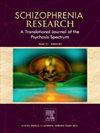Affective predictors of social support in individuals with schizophrenia
IF 3.6
2区 医学
Q1 PSYCHIATRY
引用次数: 0
Abstract
Background
Social Support has been found to contribute to lower mental illness burden, higher treatment adherence, enhanced social functioning, and better quality of life. Individuals with schizophrenia report lower social support compared to non-clinical populations, yet the factors contributing to this discrepancy are not fully clear. Specifically, the person-related variables that may enhance or hinder SS in people with schizophrenia are unknown. Evidence from affective neuroscience research has implicated emotion awareness and regulation as key predictors of social functioning, a correlate of social support. However, their potential impact on social support in schizophrenia has not been investigated.
Methods
We examined emotion awareness, emotion regulation and social support in 90 individuals with schizophrenia and 26 healthy controls.
Results
The schizophrenia group reported significantly poorer emotion awareness, more frequent use of suppression to regulate emotions, as well as lower social support. Within the schizophrenia group, results from mediation analyses pointed to significant indirect effects of specific emotion regulation strategies on social support through emotion awareness, with use of suppression predicting lower social support via decreased emotion awareness, and conversely, use of cognitive reappraisal predicting greater social support via increased emotion awareness. Notably, emotion awareness was more strongly associated with social support from friends than from family members.
Conclusions
The results highlight poor emotion awareness as a key variable critical to enhancing social support in people schizophrenia. We discuss potential mechanisms underlying the links between emotion awareness, emotion regulation, and SS, along with the therapeutic implications of the findings.
精神分裂症患者社会支持的情感预测因素。
背景:社会支持有助于降低精神疾病负担,提高治疗依从性,增强社会功能,提高生活质量。与非临床人群相比,精神分裂症患者报告的社会支持较低,但造成这种差异的因素尚不完全清楚。具体而言,可能增强或阻碍精神分裂症患者SS的个人相关变量尚不清楚。来自情感神经科学研究的证据表明,情感意识和调节是社会功能的关键预测因素,与社会支持相关。然而,它们对精神分裂症患者社会支持的潜在影响尚未被调查。方法:对90例精神分裂症患者和26例健康对照者进行情绪意识、情绪调节和社会支持检测。结果:精神分裂症组的情绪意识明显较差,更频繁地使用压抑来调节情绪,社会支持也较低。在精神分裂症组中,中介分析的结果指出,特定情绪调节策略通过情绪意识对社会支持有显著的间接影响,使用抑制预测通过降低情绪意识来降低社会支持,相反,使用认知重评预测通过增加情绪意识来增加社会支持。值得注意的是,情感意识与来自朋友的社会支持的关系比来自家庭成员的关系更强。结论:研究结果表明情绪意识不足是影响精神分裂症患者社会支持的关键因素。我们讨论了情绪意识、情绪调节和SS之间联系的潜在机制,以及研究结果的治疗意义。
本文章由计算机程序翻译,如有差异,请以英文原文为准。
求助全文
约1分钟内获得全文
求助全文
来源期刊

Schizophrenia Research
医学-精神病学
CiteScore
7.50
自引率
8.90%
发文量
429
审稿时长
10.2 weeks
期刊介绍:
As official journal of the Schizophrenia International Research Society (SIRS) Schizophrenia Research is THE journal of choice for international researchers and clinicians to share their work with the global schizophrenia research community. More than 6000 institutes have online or print (or both) access to this journal - the largest specialist journal in the field, with the largest readership!
Schizophrenia Research''s time to first decision is as fast as 6 weeks and its publishing speed is as fast as 4 weeks until online publication (corrected proof/Article in Press) after acceptance and 14 weeks from acceptance until publication in a printed issue.
The journal publishes novel papers that really contribute to understanding the biology and treatment of schizophrenic disorders; Schizophrenia Research brings together biological, clinical and psychological research in order to stimulate the synthesis of findings from all disciplines involved in improving patient outcomes in schizophrenia.
 求助内容:
求助内容: 应助结果提醒方式:
应助结果提醒方式:


